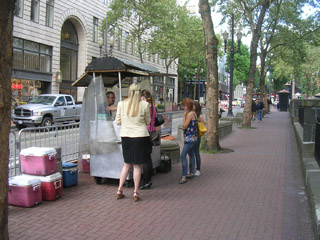|
Subscribe / Renew |
|
|
Contact Us |
|
| ► Subscribe to our Free Weekly Newsletter | |
| home | Welcome, sign in or click here to subscribe. | login |
Architecture & Engineering
| |
October 29, 2008
Opinion: Street life? What street life?
Special to the Journal

Hinshaw
|
Sometimes Seattle makes me plain crazy. We profess all sorts of environmentally and socially enlightened values and then we often ignore the obvious. Take our public sidewalks. Active, lively, livable? Maybe sometimes. Often, not so much.
We allow contractors to close off sidewalks while they build towers, despite the fact that most other cities have required protected shelters for decades. Contractors here get to close off block fronts for months while we pedestrians have to negotiate a gauntlet of “Sidewalk Closed” signs. Builders elsewhere have figured out how to stage and service a construction site. Yet we let these private companies usurp our precious public space for their own convenience and cost savings.
| What do you think? |
|
Weigh in on Seattle sidewalks at SeattleScape, the DJC's design and urban development blog, and read what bloggers like Mark Hinshaw have to say: www.djc.com/blogs/SeattleScape/ Or email maudes@djc.com with your comments. |
Another example: The State Liquor Control Board insists that restaurants serving drinks install expensive and space-consuming “corrals” made of cast iron, steel or wood around outdoor seating areas — ostensibly to protect minors. (And how does that work, actually?) Go east to Idaho and there are no sidewalk corrals. Go south to Oregon, same thing: no fences. Tables and chairs spill out onto the sidewalks like they do all over Europe and the rest of the world. Yet, I've never heard that those places have hoards of inebriated minors thronging the streets.

I am reminded that until the late 70s, the Liquor Board had a rule that restaurants serving drinks could not have windows, lest anyone be seen drinking. When they dropped that senseless rule, our restaurant industry began to flourish. Just as they changed that rule, they can certainly eliminate the ridiculous fencing requirement that pens us in.
But here is the worst example, one that truly prevents our urban sidewalks from being lively and livable. The city/county health department's rules keep us from enjoying a simple delight that is enjoyed by people in most major American cities: sidewalk food carts. (Seattle's vending ordinance is also very limiting.)
Portland's downtown is chockablock with outdoor food sellers. Virtually every block has one or two – operating between 10 a.m. and 2 p.m. In addition, numerous small food trucks park in lots and back up their counters to the sidewalks. They are often open late into the evening to serve people leaving theaters and night spots. And these are not just mushy steamed hot dogs. They're fine, cooked-to-order meals of all cuisines, from French crepes to phad thai and burritos.
None of that here, though. Seems our health department folks insist upon an employee restroom and a three-compartment sink — neither one practical for a tiny cart or truck. I am not aware that folks in Portland have been dying in droves from e-coli or hepatitis-C. And that city has been allowing these little street cafes for many years, ample time for any evidence to appear. Of course, they inspect the premises and even inspect the home-based kitchens. Portland now has sidewalks far more interesting than any we have here.
Portland allows these diminutive enterprises to sell fresh, hand-made food for several reasons. First, they see it as an economic development tool. Small, family-based, and often recent immigrant-owned businesses can start up simply and flourish, perhaps eventually moving into a storefront. Second, the city wants to offer downtown workers the choice of inexpensive lunches. Hence, if the vendors keep their prices low, they charge no permit fee. Finally, they contribute to a dynamic public realm. The little businesses maintain eyes on the street and keep the area tidy.
So simple to do. Such amazing results. Not for us, however.
Mark Hinshaw is the director of urban design for LMN Architects. He has served as president of the Washington chapter of the American Planning Association and as president of the Seattle Chapter of the American Institute of Architects.
Tell us what you think...
The Daily Journal of Commerce welcomes your comments.
- E-mail: editor@djc.com
Previous columns:
- Opinion: Incentive zoning: Good PR but bad public policy, 10-13-2008
- Letter to the Editor: Speculation drives up home prices, 10-06-2008
- Letter to the Editor: We need more well designed multifamily housing in Seattle, 10-06-2008
- Opinion: Does Seattle have too much single-family zoning?, 09-29-2008
- Opinion: Land use laws should reflect today's reality, 09-15-2008
- Opinion: There's no magic formula to get affordable housing, 08-11-2008
- Letter to the Editor: Large users have options in keeping steel costs down, 08-04-2008
- Opinion: Rail on I-90 bridge must be considered, 06-30-2008



